#lenny stevens
Explore tagged Tumblr posts
Text
A bunch of minor character redesigns + a few I never posted
Might post more of these soon too lol

^ Austin (One of Boss's older brothers) and his family - (Jeremy and Mark do not get along at all lol)

^ Darcy's parents and twin sister

^ Boss's parents

^ Luke's mom

^ Ash's parents

^ Spencer - Summer gets with him at some point in the future (And also he's Kevin Jameson's uncle lol)

^ Ben's 'friends' when he's in college (they're not really his friends) - Cliff, Wesley, Gary, and Lenny They each got their own different history with him lol.
#oh man there's gonna be a lot of tags#also feel free to send me asks about any of these people lmao#the mark side#tms#austin reed#jeremy reed#lucy reed#sharon reed#lauren daniels#richard daniels#delilah daniels#jarod reed#charlotte reed#amelia tucker#david powyrs#brenda powyrs#spencer jameson#cliff phillips#wesley york#gary beckette#lenny stevens
13 notes
·
View notes
Note
Wait in the SU AU is Sniper a pearl? Like I feel like he's a pearl and he's yellow- And Saxtons a diamond and yellow. Coincidence 👀 Or I should go back to bed
no you are on the right track anon :] here’s Pearl!Sniper’s backstory and some lore of the AU :3
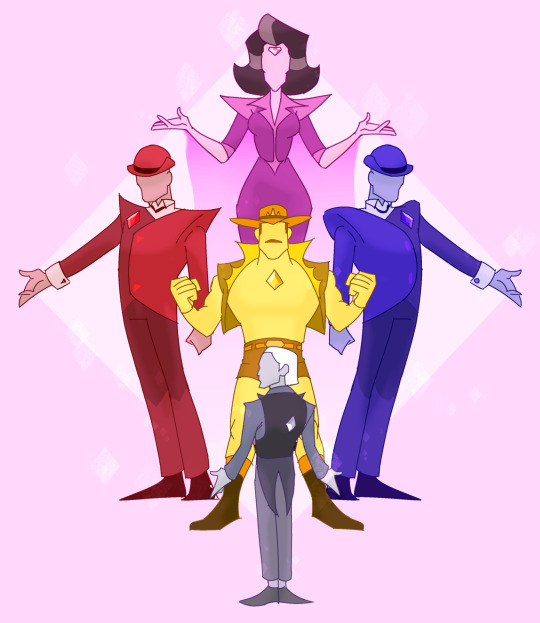
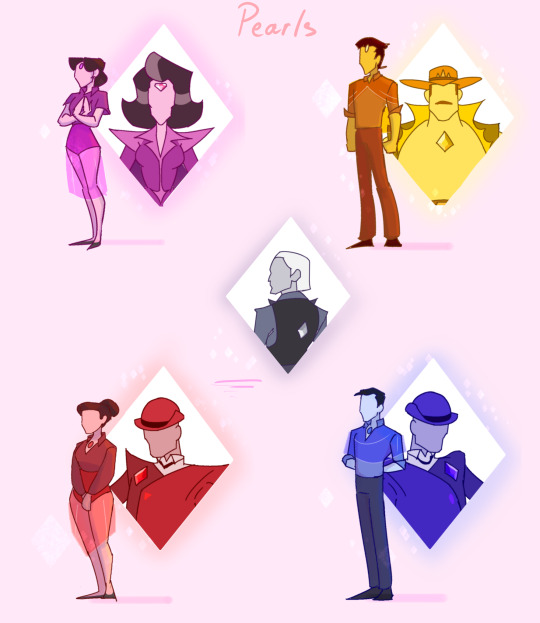
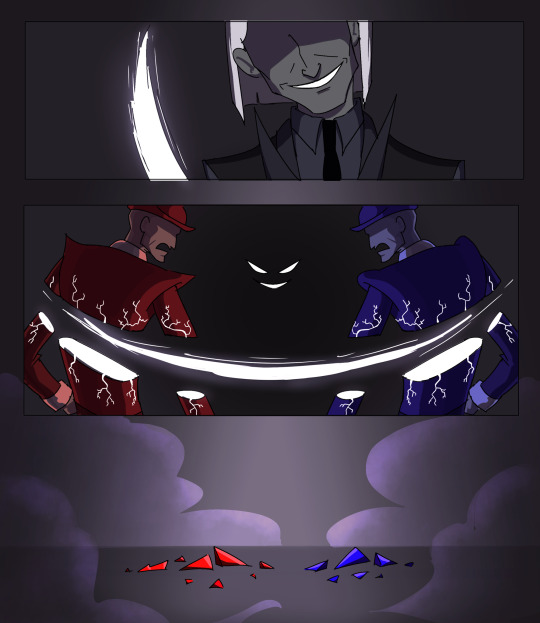
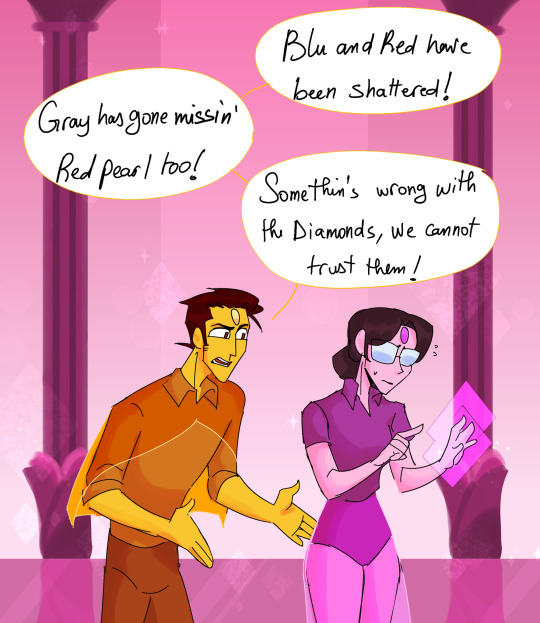
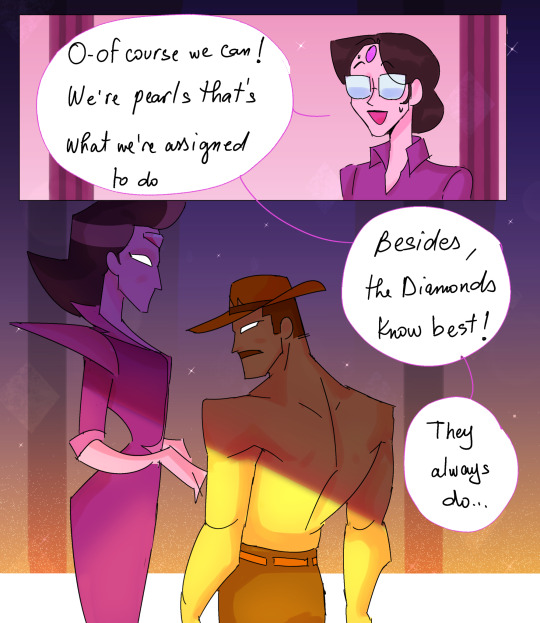

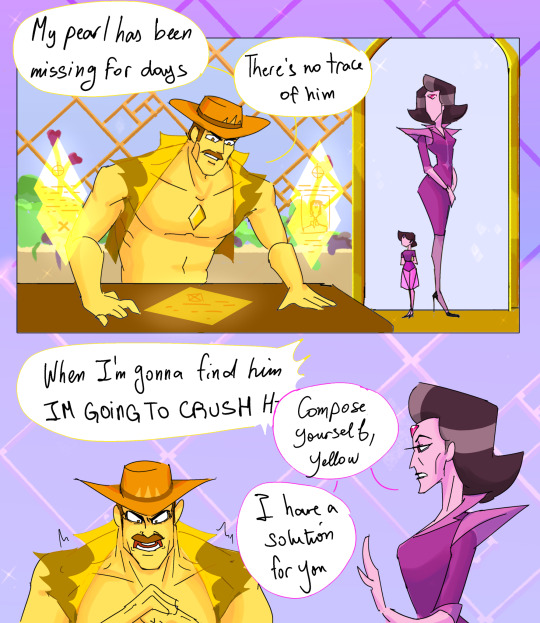
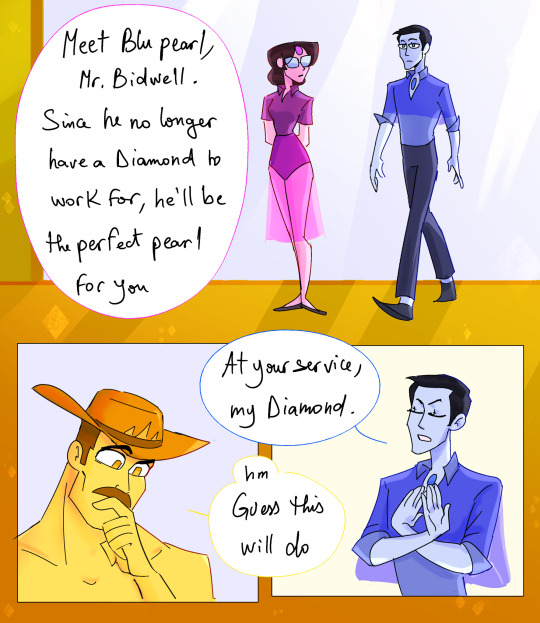
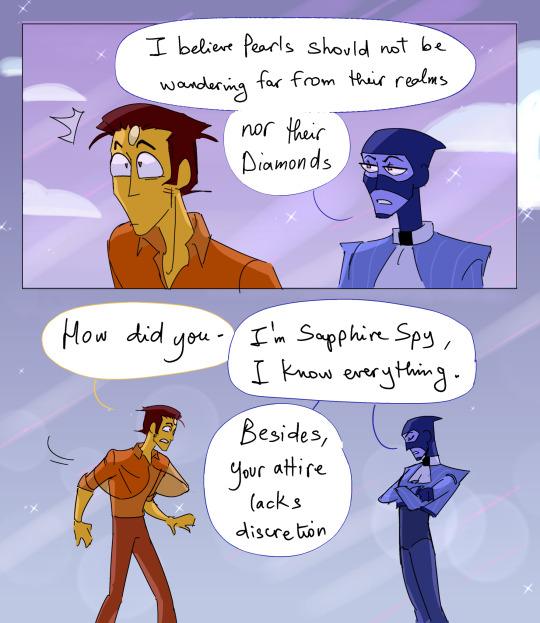
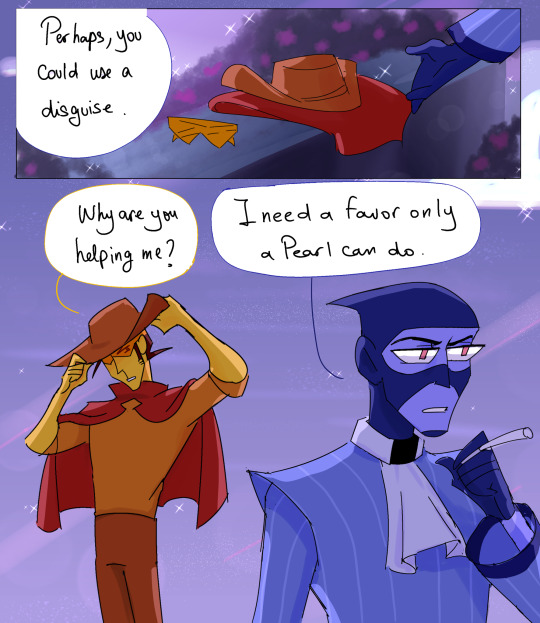
to be continued…
if you’re wondering who’s RED pearl, well if you read the tf2 comic "Loose canon" we can see Blutarch’s assistant, thats her. yes i know she’s Blu but i had already put Bidwell as Blu pearl and we never saw Redmond’s assistant so i put her instead :p
and yes Gray Diamond doesn’t have a pearl, did he shatter it? did he not deserve one bc he was the smallest and weakest of the Diamonds? idk :p we’ll figure it out later maybe lol
#im never drawing backgrounds again so enjoy this first and last attempt to draw them T-T#tf2 x su au#tf2#team fortress 2#fan art#lennylink#my art#tf2 spy#tf2 sniper#administrator tf2#tf2 saxton hale#tf2 bidwell#tf2 blutarch mann#tf2 redmond mann#tf2 gray mann#tf2 fanart#steven unvierse au#lenny replied
1K notes
·
View notes
Text
Sooo I've been obsessed with this au for a few days now and I thought.. why not use my abilities for evil
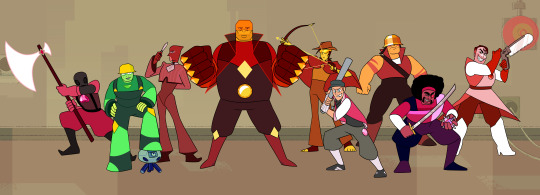
These are the designs from the tf2 x Steven Universe au by @lenny-link drawn in Steven Universe's art style! Or my best attempt at it lol.
I think the best looking ones are spy, heavy and soldier :]
Close ups↓
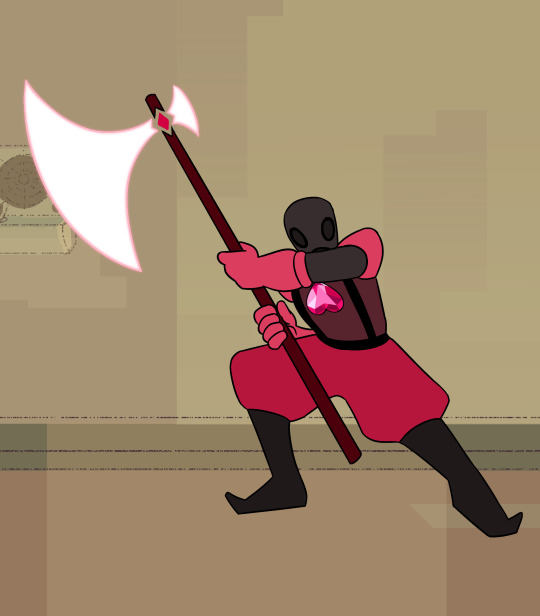
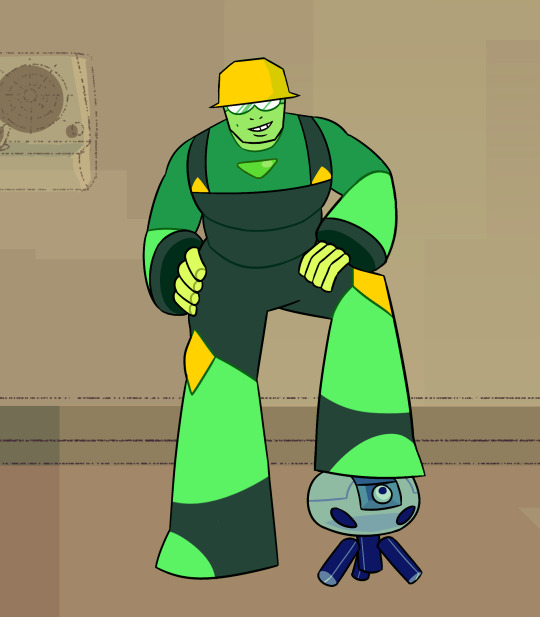
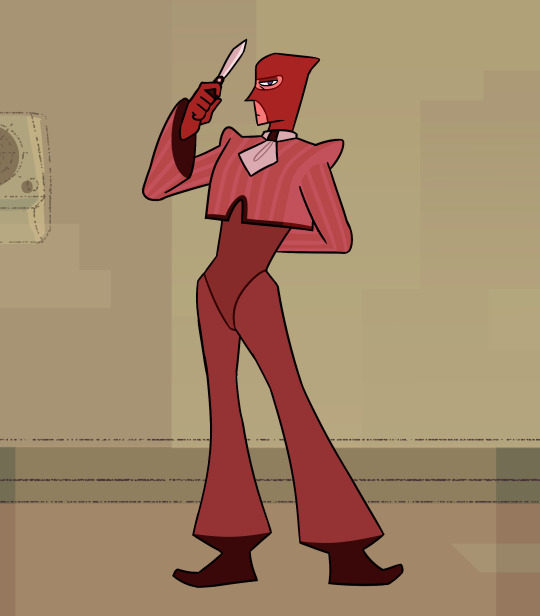
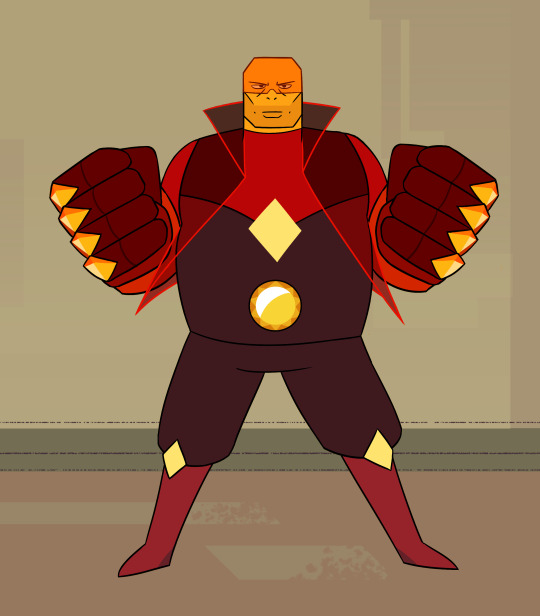

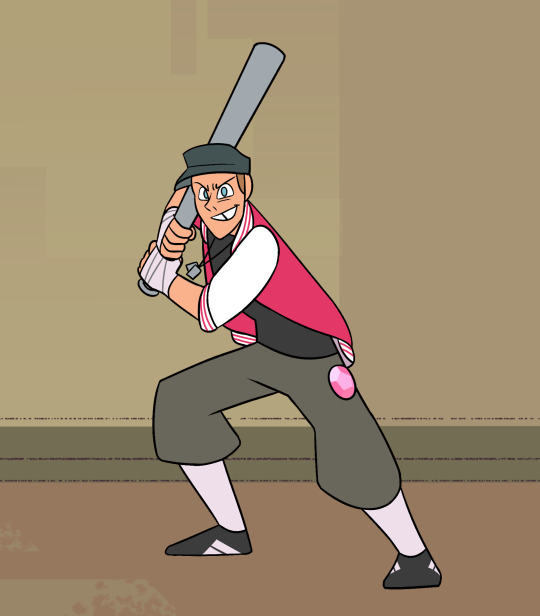
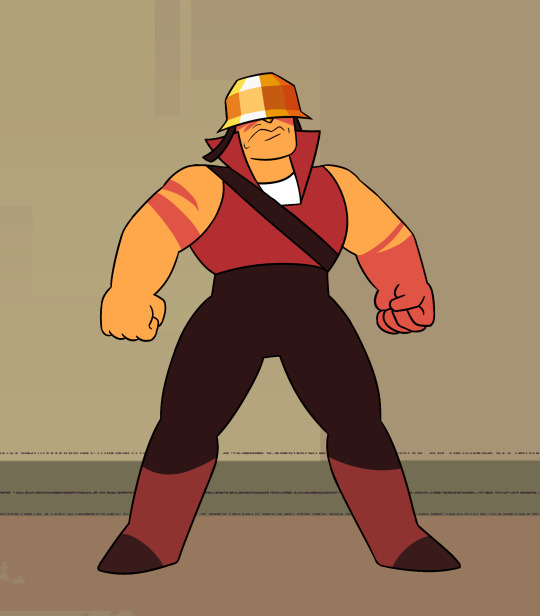

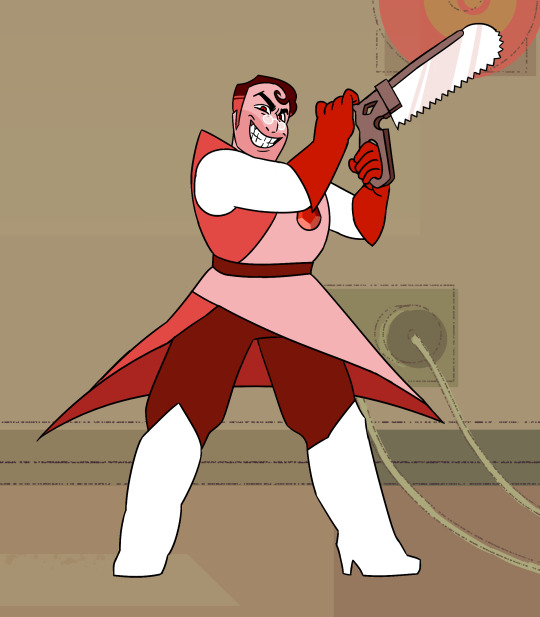
Also here's just the background; it's the bg from the tf2 lineup as a SU background, I'm really proud of how it looks hsjdjd
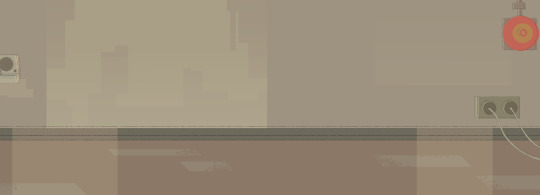
I also HAD to draw Andalusite by @gracefireheart cus good god he has taken over my entire heart. He's truly everything. The myth the legend the icon the moment. Happy pride month.
I like giving him a receding hairline cus. medic(has hair) + heavy(bald) = less hair. mathematics. The first drawing is my puny amateurish attempt at Rebecca Sugar's beautiful doodle art style. (I think I nailed the face and hair tho hehe)
(Your drawings are what introduced me to this au, I love them sm- I really hope you'll like this!!) (p.s; sorry for giving him a boob window. I wasn't strong enough.)
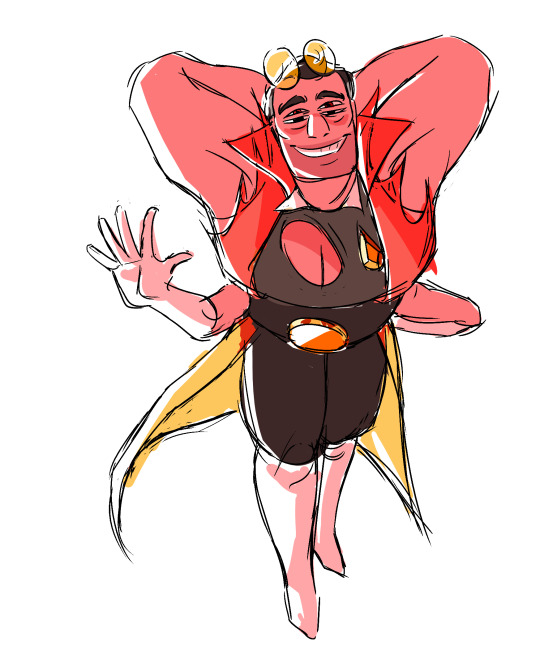
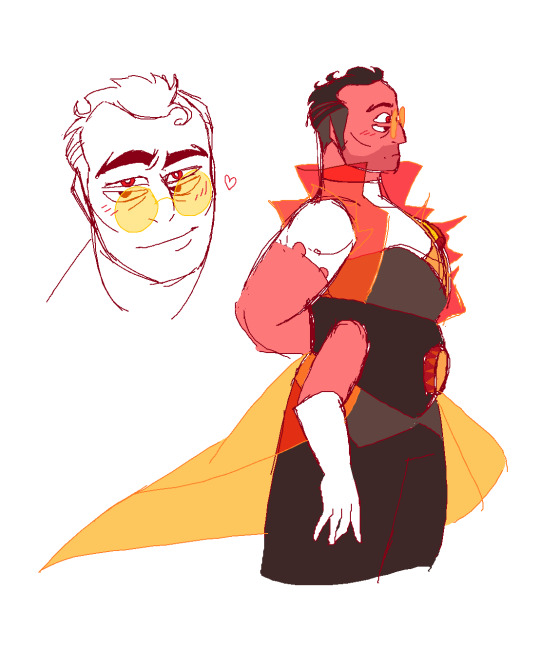
Aaaand my own design for a medic and scout fusion, Tourmaline! They only really form him when they both feel like wreaking havoc. he's impulsive, inattentive, hyperactive, he has no self preservation, and he's low-key dumb. When his senses kick in is usually when they unfuse. He can't see for shit and has to constantly remind himself to put on his glasses
(scout and medic shitty lil bratty kid + uncle who enables them dynamic truthers rise up)
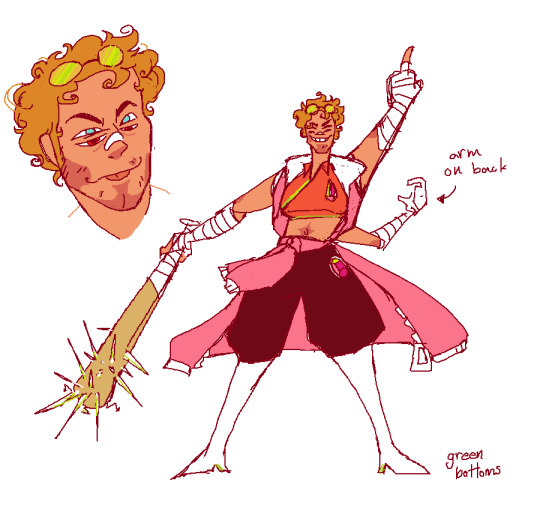
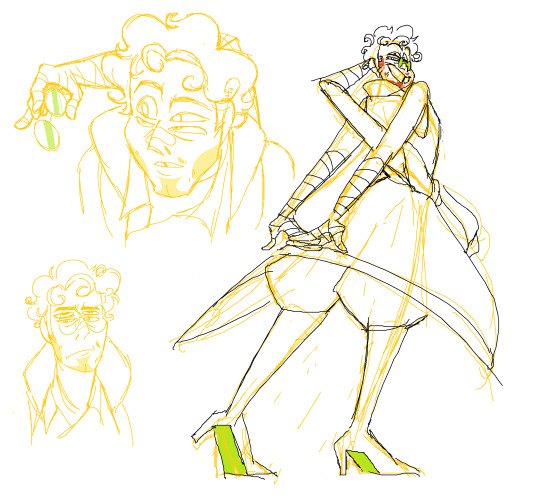
(I had so many ideas for things I wanted to post so I thought I'd just put it all in one place gsjdjd, I hope people won't mind :'] )
#tf2#steven universe#tf2 au#my art#please dont tag the last fusion as ship#Lenny-link I know you're currently inactive and I hope you're doing well#hope you see this when you come back I hope you'll like this :')) these designs were so fun to draw and translate into su's art style#I had a blast :DD <333#I had to mess with the designs a bit to give them the proportions of the gems they're based on#Or cus I wanted to add stuff :') like making spy look more like a zircon cus I'm still living for their designs#or giving sniper rutile half shoes cus I think he'll like them#Btw did you know that the rutile twins in su are voiced by Ms Pauline's voice actress (Ashly Burch)? Small world#I referenced jasper for medics smile. She is smug and evil after all.#This au revived my will to draw. I would've even animated an idea I have if I had more time
635 notes
·
View notes
Text





LEGION 1.04 – Chapter 4
#legion#legion fx#david haller#lenny busker#aubrey plaza#dan stevens#syfysource#thrilleredit#horroredit#scifiedit#tvedit#ours#by airi#usercats#userdanahscott#userbuckleys#userpegs#tuserheidi#userroza#userholtz#tusermira#userbarrow#tuserhol#usergiu#alielook#jmorganz
331 notes
·
View notes
Text
Just finished watching Legion
I put off watching the final few episodes after one of them shook me up a bit with the fate of one of them characters. The ending was actually so perfect, though. It’s so rare to see a great show nail the landing. It’s one of the best if not THE best superhero/villain(in this case) shows I’ve ever seen. It’s ridiculously creative and experimental.
Now, I just want to go back to episode one and start it over again.



#spoiler: even tho Lenny gets a devastating ending the ultimate end of the show makes me think she ends up much better off#she will definitely find Salmon again since they both end up in the same dr ug house#and she had a motivation within herself to be better#so in my mind#she gets sober with her girl#what other show has aubrey plaza as an unbalanced lesbian who is in multiple musical numbers#oh wait. i forgot about Rio…#such an amazing show#legion#legion fx#marvel legion#dan stevens#aubrey plaza#lenny busker#amber midthunder#jean smart#jemaine clement#marvel#review
61 notes
·
View notes
Text
i’m giving up on trying to be normal, i will instead be her
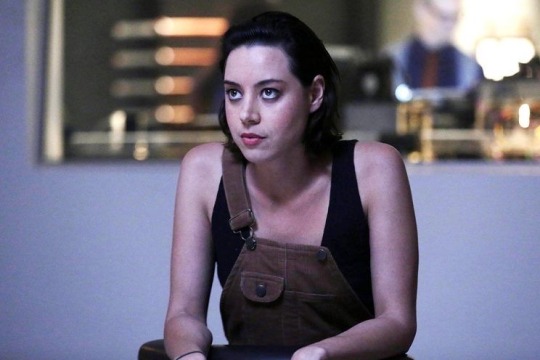
#legion#legion fx#marvel legion#david haller#lenny busker#aubrey plaza#dan stevens#noah hawley#x men#professor x
182 notes
·
View notes
Text









Various jack-o'-lantern edits of various meme faces.
#my emoji#minecraft#meme#jojo#steven universe#troll face#lenny face#halloween#jack o lantern#custom emotes#emotes#emoji#cursed emoji#custom discord emoji#custom emoji#custom emojis#custom emote#discord emoji#discord emojis#discord emote#discord emotes#emojis#roblox#I'm alive just tired and busy as hell#anime#anime and manga#video games#cartoon#spooky
51 notes
·
View notes
Text
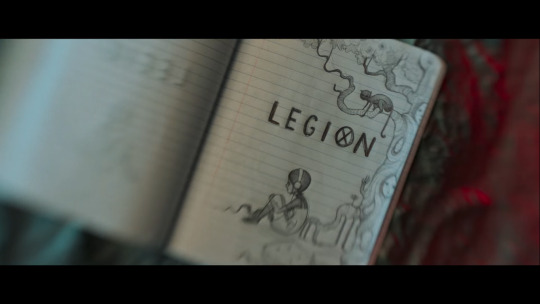




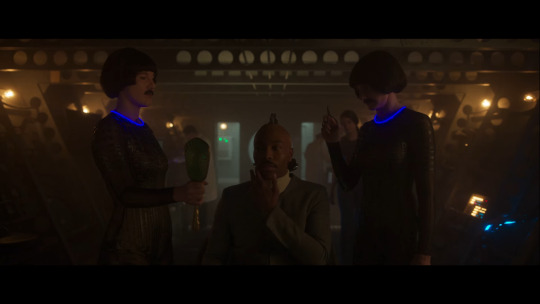


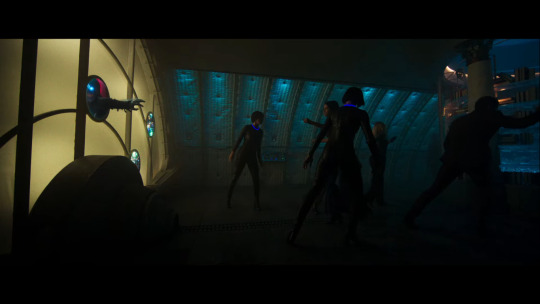
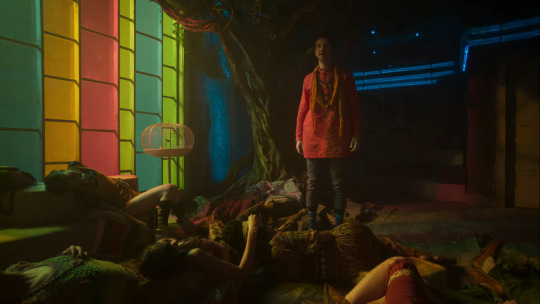
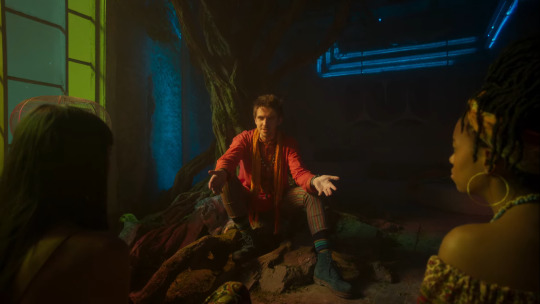

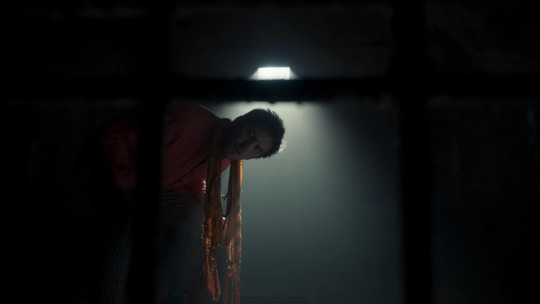

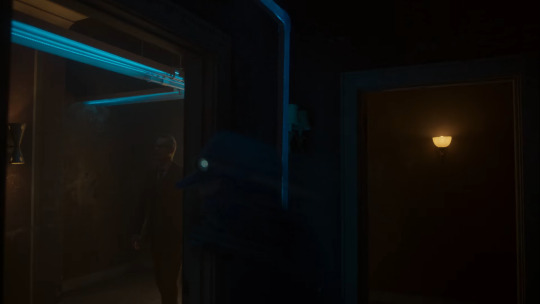



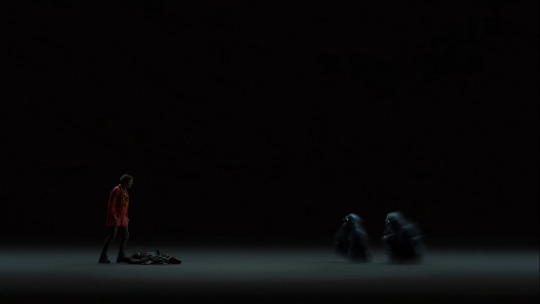
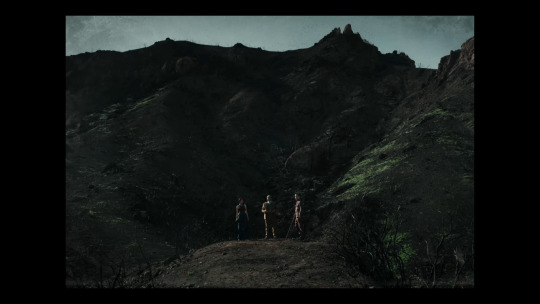

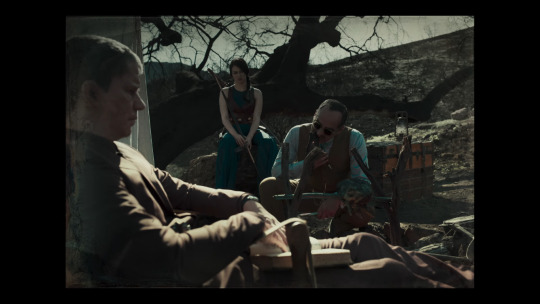
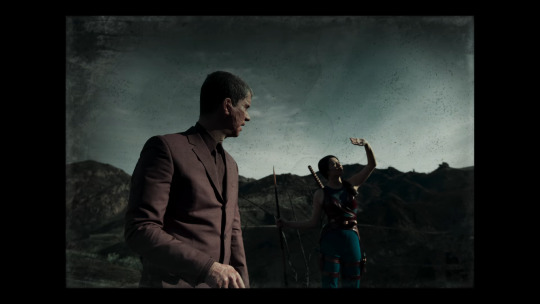
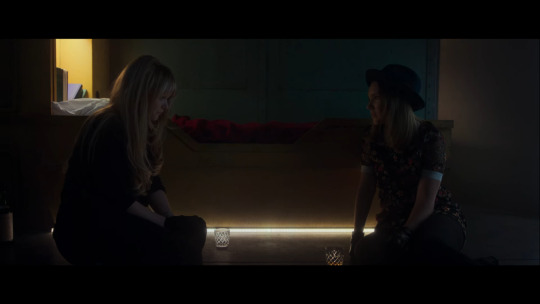

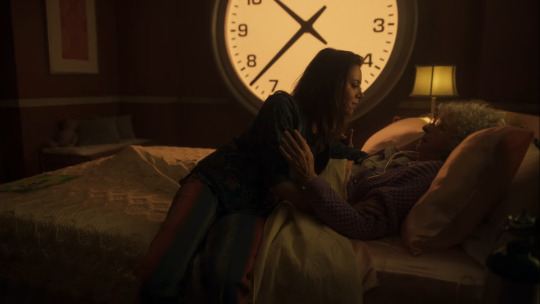

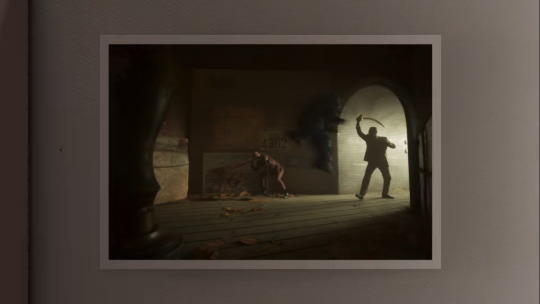


"Chapter 23" Legion S03 E04
#legion fx#david haller#my screencaps#my screenshots#dan stevens#noah hawley#rachel keller#aubrey plaza#lenny busker#bill irwin#amber midthunder#amahl farouk#x men
54 notes
·
View notes
Text
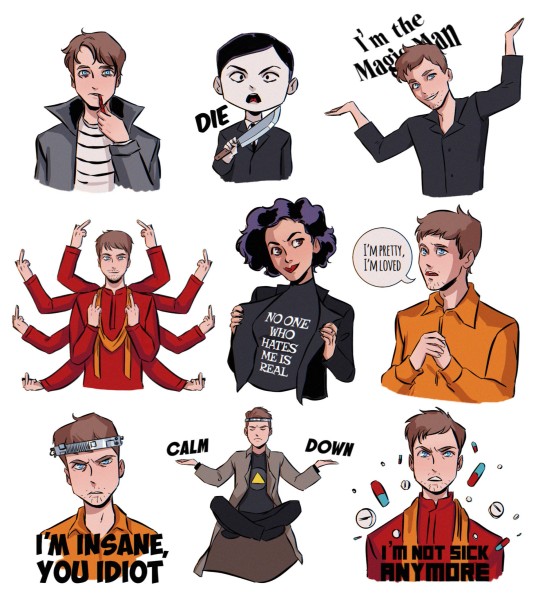
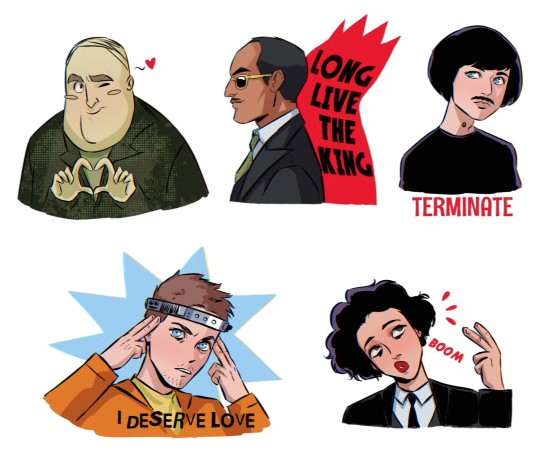
Randomly made Legion stickers for Telegram https://t.me/addstickers/legionfxshow
181 notes
·
View notes
Text

Fellas, is it gay to be in witness protection-
#I swear I'll never be able to draw rider strong 😔#I think this is the closest I've gotten so far#the pact 1999#Steven Spencer#Lenny Dalton#i'm doing my part#To be fair I didn't use any references. I think if I used just one reference it'd make a difference#ajn sketches
11 notes
·
View notes
Text
Okay, now I get why they made their eyes Like That
these babies have seen some shit

#yeah so georgie boiled alive in volcanic mud. gertrude twisted her ankle on a crevice. paul daphne steven harry margot ralph lenny louis -#georgie 2 jenny and gwennifer all got eaten by rajasaurus without a sound#AND I fell on my head#he literally ate shit AND figuratively ate shit#prehistoric planet spoilers#prehistoric planet 2#prehistoric planet#paleoblr#pp2 liveblog
238 notes
·
View notes
Note
Tf2 x su au:
Does Engineer have a insult like Peridot’s ‘clod’ or is he too engineering to come up with a main one yet
yes he would :>
and here is a fanart made by @/pew_mew12 on instagram that made love this idea of engie using ‘clod’ as an insult too lol
(pls consider checking the original artist!)


#tf2 x su au#tf2#team fortress 2#fan art#lennylink#tf2 engineer#tf2 saxton hale#tf2 steven universe au#not my art#lenny replied
428 notes
·
View notes
Text
The Walking Dead (2010-2022) tv series

-(finished) watching Season 6- 1/20/2024- 3 [1/2] stars- on Netflix (AMC)
76% Rotten Tomatoes- Season 6
#The Walking Dead#(2010-2022)#tv series#frank darabont#post apocalyptic#horror/drama#andrew lincoln#norman reedus#steven yeun#lauren cohan#chandler riggs#danai gurira#melissa mcbride#michael cudlitz#lennie james#sonequa martin green#josh mcdermitt#christian serratos#alanna masterson#seth gilliam#alexandra breckenridge#ross marquand#austin nichols#tovah feldshuh#ethan embry#Netflix#AMC
4 notes
·
View notes
Text
youtube
BRIE LARSON: Hi.
ANDREW SCOTT: Hi, Brie.
LARSON: Hi, Andrew, thanks for coming over.
SCOTT: Thank you, it's pretty tidy.
LARSON: I tidied up for you; I know how you like it.
SCOTT: You know the way I like it. You got my text: 'Make sure it's sparse.'
LARSON: Yes. So I'm excited to talk to you because I don't know how to talk about acting at all, so maybe you can teach me to talk about it or what we do - because I don't even know.
SCOTT: Yeah, it's hard to talk about.
LARSON: First of all, do you know how to act?
SCOTT: I don't know how to act.
LARSON: That's what I thought - nope, not at all. Don't know. So I'm glad that we got there first - we can get that out of the way.
SCOTT: You started as a kid, so it's playing when you're a kid.
LARSON: Yeah, exactly.
SCOTT: And then it turns into acting.
LARSON: That's exactly right. Well, I didn't know that there was anything beyond auditions for a very long time, so I was devastated when I learned that I wasn't actually booking anything.
SCOTT: Oh my God, that is so sweet.
Yeah, I thought that was it.
SCOTT: Did your parents just not tell you - ?
LARSON: That there was more? I think they just assumed I understood, but I didn't and that mentality actually really works because then I really started to enjoy the audition - at certain points.
SCOTT: Yeah.
LARSON: Sometimes it's very hard of course but -
SCOTT: Yeah.
LARSON: Just to think that the audition is -
ANDREW SCOTT: The thing is an opportunity to act.
LARSON: To learn, exactly - yeah.
SCOTT: When was the last time you auditioned for anything?
LARSON: Not that long ago. I insisted that I do it because I wasn't sure if I could do it. The team believed in me but I was like - it was so far away from anything that I had done I was like: 'I don't even know how to grasp this' so - ...What about you?
SCOTT: It's been a while since I auditioned, and I sort of - I sort of miss it because you know the way you used to come out of auditions, and you'd be sort of elated - you'd be flushed with excitement? And then if you didn't get it, if you did a good audition, you would be sort of thrilled and you, you'd be okay. It's when you don't get the audition; I think it's so hard for us actors - is when you don't get a chance to get in the room.
LARSON: Yeah.
SCOTT: And then if you've done your best, and you go: 'Okay, well they've gone with somebody that's famous or they've gone with somebody that looks completely different to you', then you don't mind.
LARSON: Yeah.
SCOTT: But I love the idea that you can sort of test it out for yourself a little bit, because we don't have much power.
LARSON: No. No actually very limited - I've learned...So, you didn't start as a kid -
SCOTT: Well I sort of did, a little bit.
LARSON: I thought so.
SCOTT: I just did a - I did a little, not like um -
LARSON: You did theatre?
SCOTT: A little bit of the theatre and commercials when I was a kid.
LARSON: Cute.
SCOTT: And I was reading that you were shy as a kid.
LARSON: Yeah. Not anymore. I’m totally fine now. I’m totally confident and cool.
SCOTT: That's - I, really related to you when I was reading that, because that’s kind of why I started as a kid.
LARSON: Interesting.
SCOTT: I think there’s a slight myth about actors — that they’re very outgoing or sort of precocious in some ways -
LARSON: Yeah.
SCOTT: - and, um, or confident in some ways. So did you ask to, to start acting?
LARSON: I did, yeah. My parents were chiropractors; they wasn't - that wasn't in the family or anything, and I was super shy; so my mom was like: 'She must be repeating something', I wouldn’t let it go. And when I think back on it, I mean, of course, it’s changed the course of my life in so many ways, but it - at a young age, at a time when I was so shy and had such a hard time expressing myself, looking people in the eye, at like 6 years old, I was basically given, like, 'OK, here’s a script for how you have a conversation.'
SCOTT: Oh my God, totally - totally.
LARSON: So it's like the actual, like, fiber of how I understand how to like, have pleasant conversations with people is based upon weekly acting sessions.
SCOTT: Absolutely; and then you all of a sudden, I - I used to go to these drama classes on a Saturday, and I would be fully shaking before I go in. And then you’d have to do like - get up in front of your other 7-, 8-year-olds, and do an improvisation, or say a poem or something.
LARSON: Oh no.
SCOTT: And something just happened where you go 'Oh' - it's like an - a weird sort of escape from yourself or, or something. And I feel like - I don’t feel like it’s an overstatement to say that I think it’s, it's completely changed my life — not just my,my career. I think if I didn't - I had a really bad lisp when I was a kid as well, so I had to do elocutions - elocution lessons. I had to go, “He sees seashells by the seashore,” and all that stuff, and it just completely got rid of it, and got rid of so much stuff that you go to, to play - it actually can really, really help you.
LARSON: Yeah, I really think so.
SCOTT: And do you feel shy now? (they laugh) No, no, no - but do you feel shy - do like it's helped you like -
LARSON: Yeah.
SCOTT: - because you have to do so many public facing -?
LARSON: I had to face myself in so many different ways; that’s part of the thing that I actually seek now....I mean, I’m so grateful that I had so much rejection growing up. It’s wild.
SCOTT: It toughens you up.
LARSON: And maybe you had a similar thing where like - I was very much like a slow burn in my career. It was not easy for me. I’d get close to things, so I knew that I had something, but I wasn’t booking, or I’d book like one job a year or something — just enough to give me hope....It gave me so much experience so that when I was given the opportunities, I was truly ready for it.
SCOTT: Absolutely, absolutely.
LARSON: I never had a time on set where I was like, 'Oh, gosh. This is bigger than what I understand.'
SCOTT: Yeah, yeah, yeah. Yeah.
LARSON: It was always, like, well paced...now when I look back on it, I'm like: 'Oh someone was looking out for me.'
SCOTT: Absolutely. Because to be exposed too early, you know, to be able to sort of play around without too much scrutiny I think is so beneficial. I think that people who get an awful lot of scrutiny at an early, early age, I think, find it harder to experiment a little bit, because auditioning is experimenting because you're going up to play a policeman and a detective and then a psycho in a thing and you're like: 'Well, I don't know, you choose.' So you're playing with all those different sides of yourself, whereas if you're cast in something that's very famous when you're 20 - I don't know, you can - you have to work quite hard to sort of, to sort of, um, you know, get yourself out of that, that, that, that space - so it’s good that I was unemployed for so long.
LARSON: It turns out I’m so happy that it seemed like it wasn’t working out for me! Look at us now! But, yeah, when I was stalking you online, I was like, “Wow, it feels similar.”
SCOTT: Yeah, similar vibes. Yeah.
LARSON: Similar. I was like: 'Oh wow, you've been doing this for so long.'
SCOTT: Yeah - a long time.
LARSON: A long time.
SCOTT: And do you know - somebody said a really good thing - just on the - to wrap up that shyness thing up - but somebody said a really brilliant thing to me which was like, “There’s nothing wrong with being shy. Be shy...Like, it's fine to be shy. It’s a nice thing you go a little bit red.” That's why I'm wearing this - just so I could be -
LARSON: I blush very easily. It’s horrible.
SCOTT: I might do it now.
LARSON: Yeah, I'm gonna do it. Let's do it...
SCOTT: It's working.
LARSON: Yeah, yeah...
SCOTT: So “Lessons in Chemistry.”
LARSON: Let’s talk about our shows.
SCOTT: Your character; she's a little bit - I wouldn't say she’s; actually she's probably not shy - would you say?
LARSON: No.
SCOTT: She's just - she's singular, but it’s not, it's not shyness. She’s actually quite forthright. What a character.
LARSON: Yeah, yeah, it's great.
SCOTT: And you’ve been involved with it for …?
LARSON: A long time.
SCOTT: A long time.
LARSON: I developed it for like - I think it took two years. Maybe longer. But I think it was about two years when we started working on it to then actually filming it.
SCOTT: Are you so proud of this?
LARSON: Yeah, I think so. I’m proud of what we achieved in the time that we did. I don’t have a connection to when it goes out in the world; it just feels like then it’s not about me anymore — it’s just images and feelings. I am proud of how much we said in the show.
SCOTT: Yeah.
LARSON: I felt like we got a lot in it, and a really amazing group of people that worked on it.
SCOTT: And you assembled the people, right?
LARSON: Yeah, I did...I was like: 'If I could be in it earlier -' - we have these amazing production meetings that happen; actors aren't invited to them -
SCOTT: No.
LARSON: So to me it always felt like playing a championship basketball game and like, your star player doesn't train with the rest of the team.
SCOTT: Absolutely.
LARSON: So, I was like...if you include me with more information, it's not gonna stress me out; it actually just helps me understand how I can better do the organizational part of my job.
SCOTT: Absolutely.
LARSON: Like the artistry is like - part of what it needs is like: 'Just tell me if we're running out of light and we only have two takes - '
SCOTT: Yeah, exactly. Yeah.
LARSON: You know, I'm so okay with that.
SCOTT: Yeah, exactly. Exactly.
LARSON: ...lots of other departments get moments where they have to - you know, they get to shine in like a spot where it's like: 'Okay, you gotta take one for the team', and I feel like the acting department could really use more opportunities to do that.
SCOTT: Yeah.
LARSON: ...it really worked; the dynamic really worked because it felt like everyone was working together and assisting one another to make the same thing.
SCOTT: I, I, I sometimes find that difficult, and it's a big thing as an actor - maybe not so much in the theatre - but, but where you're so involved with so much of your character's journey and then the edit comes and you're like: 'Wha -?' And sometimes I feel like it's important, you know, if you're an artist - and I've never had any shame about calling myself an artist because that's what we do - you may be an interpretive artist, but sometimes it can feel like you're not a co-artist, you're just the paint. You know, you just feel like: 'Okay, well, you can just take whatever' and you go: 'Well - ', you know, because I don't care about having - sometimes actually it's about having less time, you know? It's like, it's about - or less screen time; it's not about vanity, it's just going: 'Oh, well, you know, you know, how you think the, the set is of the character you - sometimes I've had that experience where you walk on and you see your character's - the set of the, the house - and you think: 'This isn't - '
LARSON: I know; isn't that amazing?
SCOTT: Yeah. And that's, that's - it's just about communication.
LARSON: I know. Also I find that you learn about the character through these department heads as well.
SCOTT: Yeah. These really skilful people.
LARSON: ...it becomes like we're finally admitting to what we're doing -
SCOTT: Yeah.
LARSON: - which is a massive team sport.
SCOTT: Yeah, absolutely.
LARSON: It's a lot of people making one piece of art.
SCOTT: Yeah.
LARSON: And I think problems arise when we act like that's not what's happening.
SCOTT: Absolutely.
LARSON: So I want to talk about your show.
SCOTT: Ripley - yep.
LARSON: That one - I know you've got a lot going on, but we're talking about that.
SCOTT: No, no - that's it.
LARSON: So what kinds of conversations did you have ahead of time, and I'm thinking specifically, when I was watching it, I was like: 'I love minimalism' and I'm like: 'You are a minimalist', and I mean that as like the highest compliment.
SCOTT: Oh wow.
LARSON: It's like you're just - and for so long not talking.
SCOTT: Yeah.
LARSON: And I was like: 'Oh, it took me my surprise.' I was like: 'Oh yeah, he still hasn't really said anything.'
SCOTT: Yeah, yeah.
LARSON: And you're also playing someone who's lying a lot -
SCOTT: Yes, yeah.
LARSON: - which I think is one of the hardest things to do.
SCOTT: Yeah, it's hard - yeah. Yeah.
LARSON: And so in thinking about how you do something SO minimal with lies -
SCOTT: Yeah, yeah; I know what you mean.
LARSON: - you're doing a very fine dance there. What kind of conversations are you having, and does it feel good to be in that minimal space, or do you second guess yourself?
SCOTT: I second guess myself, I think.
LARSON: ....I'm not a good interviewer.
SCOTT: No, you're a beautiful interviewer. Do you know what? I know exactly what you mean - your concern sometimes, or my concern, and maybe it's from, from a theatre thing, is that I always have had this slight terror perhaps that I was doing like too much - a sort of shame I remember that I would feel in my early film stuff - I'm like: 'Oh God, pull back a little bit.' But then in the theatre, there's something I think is completely wonderful about people being, um, wonderfully expressive with their body, but also some of the, the film actors that I love are actually incredibly expressive as well - it's not all just, you know, completely poised. And if I'm honest, I think I gave Steve Zaillian, our writer/director quite a lot of, um, options; I feel like that's my duty, and he chose the ones that, that are probably a little bit more to his taste, which are, you know - he's very, very sparing, um, he likes minimalism himself, and I'm happy to provide that for him.
I find it so difficult to watch myself, I don't know - that's one of the, one of the things that I was going to ask you when, when, in Lessons in Chemistry, like, do you - are you looking at the edit and all that kind of stuff?
LARSON: Oh yeah, all the time...
SCOTT: Do you find that you were able to…
LARSON: … detach?
SCOTT: Yeah, yeah.
LARSON: You have to. The first time I edited myself was years ago and the editor so smartly always referred to 'her' as 'her.'
SCOTT: Yeah, yeah.
LARSON: 'She's this' or 'I wish she was - ' and it really helped because it's not about us criticising; like, no one has to feel like there's something wrong with saying that something wasn't right in front of me.
SCOTT: Absolutely. Exactly, absolutely.
LARSON: I’m just like, “Of course I didn’t do it all right.”
SCOTT: Who'd want to be right? Exactly. I think there’s maybe a fear that people are going to say, “We need another close-up of me, please. Why is no one focusing - push in, push in!” And it's actually a lot of the time, because it's a collaborative actors are used to, we're not - you know, a lot of writers or even directors don't get to see other directors' work in a rehearsal room, or what their process is, whereas actors are always looking at other actors and how they're doing on set, or how they - you know; it's - you're very like, open to being told: 'That wasn't so great.'
LARSON: I like that.
SCOTT: Yeah.
LARSON: ...I felt very committed to finding what things weren’t working...a lot of the time I'd be looking things every night -
SCOTT: Yeah.
LARSON: - I'd look at the dailies from the day before -
SCOTT: Yeah.
LARSON: - and so you can kind of see like...are there ways to save this a little bit?
SCOTT: Yes. Map it out.
LARSON: Especially with a character that I also felt was very different from me, and how little she emotionally expresses.
SCOTT: I love that about it.
LARSON: I struggled with it a lot, and I felt very lost with it. I am just very used to my understanding of when something’s working — when it feels very true and I’m just in it. And I would be in it with her, but I felt like the part of me that would want to cry, for example, was being pushed. She’s always twisting the knot inside, and won’t give it to anybody.
SCOTT: Yeah, I love that about the performance.
LARSON: ...the third episode is about grief and...I realised that like the little part inside of me is like: 'Are people going to think I'm not doing enough?'
SCOTT: Yeah, that's the fear isn't it?
LARSON: Yeah, it's like: 'Why? What is she doing? She's not doing anything.'
SCOTT: Yeah, yeah. Yeah.
LARSON: ...it takes a lot of confidence to not telegraph every little thing.
SCOTT: Have you had a lot of experience where you've been on a project and you think the stuff that you provided has not been seen and they've used takes or they've manipulated your performance into, into something where you feel like: 'That's not exactly what my taste would be but I -' Yeah.
LARSON: Yeah.
SCOTT: It's difficult that, isn't it?
LARSON: ...you just go and you give them raw materials -
SCOTT: Yeah, yeah.
LARSON: - and then a year later, you sit with your friends and family -
SCOTT: Yeah.
LARSON: - and it's on a giant screen, and you see how your stuff was edited together that doesn't seem right.
SCOTT: Yeah.
LARSON: And I think there's a part of it though that I like -
SCOTT: You give it up.
LARSON: Yeah, I like that...sometimes I want to drive the car, sometimes I just want to be the passenger -
SCOTT: Yeah, yeah.
LARSON: - and there was something about this show -
SCOTT: Yeah.
LARSON: - this story, that I was like: 'No, I want to be in every part of it.'
SCOTT: Yeah, yeah, yeah, yeah.
LARSON: ...it would have felt really strange not to.
SCOTT: Yeah.
LARSON: But I'm happy to live in like another director's world for a while.
SCOTT: Absolutely.
LARSON: I've worked with people that are like - never blink...
SCOTT: Yeah, yeah, yeah.
LARSON: ...and you learn all these different ways of expressing -
SCOTT: Yeah.
LARSON: - which is cool.
SCOTT: And it's one of the reasons I think that I like; I quite like to move from different - because I'm not sure if I would be able to cope with that if that was for like 10 years, where you're like: 'This is this person's vision and you have to slot into it without having some sort of - without wanting to sort of break free a little bit.'
LARSON: Yeah, I agree.
SCOTT: So I, as you say, sometimes it's okay to be in that world, and then you watch and you go: 'Okay, well that's - I'm there to serve that person's vision; there are things that I would do differently', but I think that's the struggle. And I think - what I never want to do is to be able to be on set and think: 'This is the way I see it, so I'm not going to provide them with any options.' You know what I'm saying?
LARSON: Uh-huh.
SCOTT: So you just do it. I feel like your job is to be like -
LARSON: Yeah, give a bunch.
SCOTT: Give a bunch. You know, I think it's pretty courageous - I'm, you know, a huge advocate for actors and the kind of courage and vulnerability it takes to be an actor; I really do. I really - I, I think, you know, to put yourself out there and then to have to watch your big face on, on like, on a big screen with other people -
LARSON: I know, TV's better.
SCOTT: TV''s better - exactly.
LARSON: It's like iPad size; I can deal with that.
SCOTT: Yeah exactly. Watch it on an iPhone.
SCOTT: Do you watch a lot, a lot of your stuff?
LARSON: No, not at all.
SCOTT: Yeah.
LARSON: No, no; I mean with Lessons -
SCOTT: Yeah.
LARSON: I have watched it a lot -
SCOTT: Yeah.
LARSON: - because I was editing the show but -
SCOTT: Yeah.
LARSON: But normally, no.
SCOTT: It's so extraordinary. It must feel - do you have a different feeling of pride now that you've been, been so involved with it, so its success - does it have a sort of -
LARSON: It feels good, but you know, it came out during the strike -
SCOTT: Yeah.
LARSON: And so it felt very -
SCOTT: Yeah.
LARSON: It just came out and it lived its life, and I really appreciated having that experience to truly just let the piece speak for itself.
SCOTT: Yeah.
LARSON: That I couldn't come in and explain myself.
SCOTT: Yeah.
LARSON: And I realised how much of our artistry is then us trying to explain -
SCOTT: Or sell -
LARSON: - a lot of questions about like: 'What do you hope people get from it?' And I'm like: 'I'm more curious to know what you do get from it than what I thought I was saying.
SCOTT: Well said. That's exactly it - it's like, sometimes it is, you know, we are contractually obliged to talk about this stuff, but sometimes you think: 'Did you like it or did - did you not like it?'
LARSON: Yeah. Like I want people to have their own experience.
SCOTT: Yeah.
LARSON:...I struggle with talking about acting because I didn't go to school for it.
SCOTT: No, I didn't either.
LARSON: You didn't?
SCOTT: No.
LARSON: I knew l liked you - we have so much in common.
SCOTT: Oh, not a minute's training.
LARSON: ...So I have a hard time understanding fully...there's the preparation part, which I care a lot about and enjoy -
SCOTT: Yeah.
LARSON: - and there's there's just something that happens on set that seems to be truly divine that I can't even take credit for.
SCOTT: Yeah, that's exactly right.
LARSON: I don't even know how to explain it.
SCOTT: It's not, it's not; but it's - again, you know, it's something I say endlessly, but you play a part - you play a part, people - so your work of course, your work of course is important, but if you were to say a kid is able to just do it, and you don't go: 'So what did you - why did you just make that teacher, why did you, why did she arrive on a, on a unicorn? Where did that come from? What do you think about unicorns?' The kid's just like: 'I don't know.'
LARSON: It's just free.
SCOTT: It's just - it's sort of, it's sort of freeing, and to be able to hold onto that as much as possible; and that's not to say that the work isn't - you know, the preparation and all that kind of stuff - but the first priority is to be there, on the set, and to be like: 'Well maybe we don't know what's going to happen now.' So we have to unlearn what - the, the idea that, that we do.
LARSON: Just being present, yeah.
SCOTT: Just be present, listening.
LARSON: So what about the lying part of your character? How did you -
SCOTT: My own? Oh, Tom Ripley.
LARSON: Yeah, sorry, sorry. I jumped. So when you’re playing Tom Ripley -
SCOTT: Yes?
LARSON: - what does it feel like to lie when he’s lying?
SCOTT: Well, I tried to make him lie as little as he could get away with, so that he lies in order to get himself out of a situation. And he murders to get himself out of a situation. Like, so he's not going: 'When am I gonna -?' He’s not bloodthirsty. He's, he's doing it because he had nothing else to do - sort of - I mean, he could have not murdered, I suppose.
LARSON: Yeah, yeah.
SCOTT: We all make that decision.
LARSON: Yeah, no, it’s a choice you make every day.
SCOTT: Yeah...so I tried to sort of - it's that thing of just going: 'Okay well, it's seeing somebody think', although, you know, it - a lot of the time I think the best acting opportunities is when someone like; the thing that we really, really want to see when we're, um, watching a movie I think, or at least I do, it's when someone goes: 'I'm not in love with them at all' and you know that they are.
LARSON: Uh-huh.
SCOTT: That's the best. When you're - when, when the thing that you are expressing is, is in opposition to the thing that you're feeling; and that sort of is lying, but it's lying sort of in a way that we find acceptable. So all that stuff and you go: 'How is she?' and you know you're - that brilliant acting that when people when we disguise what we're feeling, which we do so much. Um, so I suppose any of those things about him being a liar or socio - sociopath, or any of those kind of things I found kind of unhelpful. And actually the kind of stuff that Tom Ripley I suppose is famous for as an iconic sort of literary character is him being — “Is he a psychopath?” or “Is he a murderer?” or whatever. But the murder-y parts actually only took up - we shot it for nearly a year - they only took up for a few weeks, so the rest of them was actually -
LARSON: He’s mostly not murdering.
SCOTT: He's mostly not murdering.
LARSON: I noticed that too...I guess it's like the times where I've had to do a scene where it's lying or trying to get away with something; it's an interesting and very fun dance where you know in order for the scene to work, you can't let on to your scene partner that you're lying, however you're kind of giving the *clicks tongue* to the audience like: 'Go with me here.' And that's so fun...it felt like I was doing target practice...it's very fun.
SCOTT: Yeah, and it's like when someone's playing an evil character in a bad piece of television, and then they've manipulated someone and they hug them and then over their shoulder -
LARSON: Yeah, oh gosh - fabulous.
SCOTT: It's like - when has anyone ever done that in real life? But I do think it's extraordinary how human beings are, are - we're able to disguise absolutely what's, what's going on. Recently, my mother died very recently, so I'm doing a lot of press at the moment and, um, I've had to do a lot of, you know, in, in the grieving process, and I re - the thing that's really al - alarmed me, or it's certainly something that I found really um, uh, astonishing, is that I know that when I'm talking to someone on the street or like you're getting into your Uber or whatever, you're like: 'Hey, how's it going?' But there's no part of me - even though I'm going through this devastating time in my life - there's no part of me that's conveying that to, to, to, um - to, to the taxi person at that time.
And it's like when you're doing period dramas, when people talk about war, wartime stuff, that you're not spending your whole time talking about the war. It's like during the pandemic, you - when we were all dealing with the pandemic and somebody would come round like: 'Can we please not talk about that? Do you mind if we don't?' So sometimes when you're going through the very thing that's the stress - where is it living? There are some people who actually don't want to talk about it, and I think sometimes the unconvincing things when we're seeing things like that are set in World War II, that they're always talking about World War II. And the rest of us are like: 'Oh My God, can we just lighten up or, you know, whatever'. And, and, and I suppose that idea of what we're able to disguise I've always found so interesting about acting, you know, and um, and so that we get a story that's perhaps very comedic and you play the soul, or you get something that's very tragic and you play the, the lightness - I think that's what the, the great actors are sort of able, sort of able to do. It's a fascinating thing to discover; it's never like - it's never one thing. And so did you find it hard, when you finished Lessons in Chemistry, to let it go?
LARSON: ...it's a true loss of purpose.
SCOTT: Yeah.
LARSON: My purpose was this thing; it's not there anymore - what do I do now?...
SCOTT: Yeah.
LARSON: ...I was pretty tired by the end of it.
SCOTT: I bet you were.
LARSON: ...it felt very complete.
SCOTT: Yeah.
LARSON: But I missed it. Like, I missed that feeling of having a purpose that was beyond myself.
SCOTT: Yeah, yeah.
LARSON: ...that feeling - it's so rare too.
SCOTT: Yeah.
LARSON: ...it felt really satisfying.
SCOTT: Yeah. The obstacle sort of becomes, becomes the way. There's a - a director that I, that I worked with that I - he said a thing that I really, just really loved which is: 'Of course in artistic situations, you're going to argue and you're going to have differences of opinion, but that you should argue as allies not as enemies.' And I thought it's such a beautiful thing to say because I think sometimes a difficult set, and I don't believe that I, I don't believe that there isn't anything that through communication you can really just, everybody mostly wants to make it - do it right.
And there's a, there's a choice that you can make to say okay; to set up an environment where you're able to just communicate things a little easier and, and people who are just, um, in the business of making sure that they get their own way I think - it's; it's - I think that can happen to really very talented people, and in a way sometimes understandably, because I think actors have to save the day an awful lot of the time and, you know, I don't like it when people say: 'Oh you know - ' Sometimes it can be: 'Oh that actor is difficult.' I've never really - maybe that's just my experience - but I've never really seen an actor go: 'I don't like my costume. I've got, got, got, you know; I'm not coming out of my trailer.' Usually I've seen actors saying: 'My character just wouldn't say that; the audience isn't going to buy that, and I don't want to let the story down or the audience down - that just doesn't make sense and so, you know, let's not do that. Let's not proceed until we've solved this problem.'
And I think that's an honorable thing to do because then what happens is it comes out and everybody goes: 'Oh God, that's really clever' and you think: 'Well, that was going to be passed over because people were only interested in completing the call sheet that day.' Sometimes you've gotta just go: 'We've covered it, but we haven't captured it' and I think that's -
LARSON: Oh, I like that.
SCOTT: Yeah, yeah.
LARSON: Okay, so I have a question about playing a character that has existed in many different iterations and forms.
SCOTT: Yeah.
LARSON: And I feel like you have experience with that, because you do theater as well.
SCOTT: Yeah, yeah.
LARSON: Do you have the same approach every time, in terms of researching and watching previous versions of it?
SCOTT: Yeah, yeah. Yeah.
LARSON: Or do you just block it out?
SCOTT: Absolutely, I block it. Because, No. 1, I adored the film “The Talented Mr. Ripley” — the Minghella movie with, with Matt Damon and Jude Law and Gwyneth Paltrow and all those amazing people. But mercifully, I hadn’t seen it in a very long time, and I knew that this was going to be a very, very different prospect. Um, one of the first conversations I had with Steven Zaillian, our writer-director, you know was “What? Why?” And he had such a singular vision for it, you know; he wanted it a very particular way. He wanted, you know - I was worried that I was too old and blah, blah, blah — because I had just a very specific idea that was based on the film, but I suppose I had to remind myself that that's - that film was also a re - a reiteration of something: there was another version with Alain Delon before, and there were diff - you know lots of different Ripleys and there were loads of different ones. So it has been reinterpreted a lot. And I feel like it’s very important that, you know, he said, you know, “We want to age the characters up.” And then, you know, he was talking about this very particular kind of noirish black-and-white version that he had. And that made me feel very comfortable. He had no interest in, in doing that again. And I always think that it’s important, you know, because it happens in the theater so much — if it was a Shakespeare character, you know - you know, thousands of people have played, played one character. And I always find that really interesting. And I think the response I suppose is to be respectful, but not too reverent. Because what’s the point of doing it if you’re going to do it exactly the same way? So I didn’t look - no way, because you know, I don't want to do it for myself; I don't want to do it for myself - I don't want to do that because I love that film, and I see them as two very, very separate entities, which they are. I mean, anyone who would see it, you'd go: 'They - they're miles apart.' Thank God, yeah.
LARSON: What do you think about some sort of Ripley universe — you know, into the Ripley-verse? Just all the Ripleys.
SCOTT: Like little - like Marvel? Oh, sort of like the Fantastic Four? Is that a thing? Oh, and they all get together?
LARSON: Yeah, Ripleys together. I’m just curious because I got a couple studios interested, so I just …
SCOTT: You do? So kind of you! You are good. You make things happen. Are you not tired? You’ve been setting up projects for me? God, you’re kind.
LARSON: No, I’m writing a part for myself as well.
SCOTT: Oh right, you're gonna be in it too? You could play - you'd be a good Tom Ripley!
LARSON: I'll be a Ripley as well.
SCOTT: I have to ask you about working with Lenny Abrahamson, because it was such a moment of Irish pride. A sensational movie. Do you get bored talking about Room?
LARSON: I actually don't talk about it that often...I had someone come up to me and say: "You know what film you were good in? 'Room'." I was like: "Okay." (laughter)
SCOTT: "Yeah, thank you. Where is my Oscar?"
LARSON: I was like: 'Yeah, I kind of thought that was like my one thing I've done...'
SCOTT: I thought you were good in that; I don't care what anyone else says. I thought you were quite good.
LARSON: 5000 years later, I was like: 'Glad it holds up.'
SCOTT: That's amazing.
LARSON: But what part did you want me to talk about? Lenny?
SCOTT: Did you know what it was going to be so -
LARSON: Did I know he was Irish? (laughter) No. Did I know it was going to be good?
SCOTT: Yeah.
LARSON: No...
SCOTT: In Lessons in Chemistry, did you have a feel - because you had more control over it? Did you think: 'We're onto something here?'
LARSON: Yeah, because also you're doing everything at the same time...with 'Room', it was my first time - I mean I'd been a lead in one other thing.
SCOTT: Wow, really?
LARSON: I auditioned for it though...it took a lot of time and I did not have the technique that I have now.
SCOTT: Meaning like?
LARSON: I was like what I think actors are like where they like have headphones in and they're kind of like this (leans forward and over). I was that kind of actor.
SCOTT: Yeah, yeah.
LARSON: I was listening to really intense music; and it's like I didn't fully truly myself to go in and out.
SCOTT: That's so interesting.
LARSON: ...after that movie I was like: 'Woah, I need to figure out a plan' and I started scuba diving, and I realised that it was the perfect metaphor, because you don't get to like strap a tank on your back and just jump in the ocean. You have to be like: 'Okay, this is how much I have in my tank; if I go down deeper it takes more, I have to go really slowly on the way up.' And was like 'Oh. That's what I need to be doing.'
SCOTT: Wow, yeah.
LARSON: And I need to give myself the grace of that. So then moving forward, when I'd have big emotional scenes, I'd make an announcement and be like: 'Hey, I'm gonna go underwater for a little it. It might take me a while to get back out, but I'm here and I'll be okay.'
SCOTT: That's really wonderful. So as a producer, you felt like it's your job, when you have a big scene on, on Lessons in Chemistry, where you think: 'Okay, but now today, all I can do really is act'?
LARSON: Yeah. Sometimes you have to put the phone down -
SCOTT: Yeah, yeah.
LARSON: - and other times, you want it though.
SCOTT: Yeah.
LARSON: Other times it was very helpful to be like - to snap out of it and to be like: 'Okay, now I need to deal with whatever is going on.'
SCOTT: Yeah, yeah, yeah.
LARSON: ...that was the learning lesson from 'Room'...I didn't want to mess it up.
SCOTT: Well, you didn't. I agree with that guy. I actually thought you were quite good in it.
LARSON: ...I even remember seeing the movie for the first time...it's just a white wall to me -
SCOTT: Yeah, yeah, yeah.
LARSON: - so I just remember the first screening and everyone was like: 'What the hell was that?' And I was like: 'Is it good?'...it's maybe my own performance, maybe on a good day I can receive 40% of it through the screen - like, on a good day.
SCOTT: On a good day. Like, it's hard.
LARSON: ...it'd be really weird if I was like watching myself being like (motions looking teary and proud)
SCOTT: 'Oh, you go, girl'.
LARSON: Yeah, it's not for me...
SCOTT: Well that's why I'm asking about when you have a producer role, and I've definitely had it in, in the theatre, but in the theatre - what I love about working in the theatre is that you; it's the only art form - stage work - where you don't get to see the result of what you're doing. You're a painter, see the painting, you make a movie, see the movie, the book, you read the book, if you write, write a book, but this - you only see it through the feeling in the room and the audience sort of reflects it back to you. And I love that about it because sometimes when I see my own work, or like when they film theatre, I find it horrific because I think: 'Oh God, I, I - like just stop, or whatever you're doing, desist.' And uh, so that's why I'm asking about the producorial thing where, where I do think there must be some other hat that you have on that actually goes: no, I think - that actually your, your development of your, your ability to be able to discern what your performance is must have to - must, must be quite strong.
LARSON: Oh yeah...Lenny would talk to me and brief me on what he was trying to achieve...and then once the doors closed, it was really hard to get in and out, and so it was much easier if I understood what Lenny's agenda was, and I could just be there instead of constantly resetting. And so, there was one day in particular where I realised I could hold this scene with the boy, with Jacob, and also fix the props that were needed to be reset, and wait and hold...I remember being like: 'I think I've just unlocked like a new level of focus and flow -
SCOTT: Yeah, yeah.
LARSON: - and it's a really amazing thing.'
SCOTT: Yeah.
LARSON: You felt that too?
SCOTT: I know exactly what you mean.
LARSON: Isn't it the best thing ever?
SCOTT: It's great. It's like - it's, it's, it's a challenge and everybody's like doing that together; like isn't the best thing I think about filming is when everybody's got a big, big job - I don't know, some big shot, everybody, somebody's going to have a change of clothes; it's all sort of quite theatrical - theatrical - and you're really involved all together. I find that really the most exciting thing. That's why I think it's beautiful what you say about everybody just doing the same thing; we had it on - again, to go back to the theatre - but we had it where we were all called co-creators, but that's exactly what you're doing. You're all co-creating together, and so if you were to just take out the job titles and go: 'Well, everybody has an opinion here; what's the thing', and everybody, you know, everybody's just little, little cogs in this amazing machine.
LARSON: Exactly.
SCOTT: Yeah.
LARSON: We need it all.
SCOTT: We do; we need everything.
LARSON: Well thanks; I feel like I kind of understand acting now.
SCOTT: Yeah I've fully - I've fully got it.
LARSON: Yeah, I'm ready. Okay, well -
SCOTT: Nothing more to learn.
LARSON: There we go. Now we're good to go. (laughter)
#Andrew Scott#Brie Larson#Actors on Actors#Netflixc#Ripley#Lessons in Chemistry#Apple+#Long Post#Steven Zaillian#Room#Oscars#The Talented Mr Ripley#Matt Damon#Jude Law#Gwyneth Paltrow#Anthony Minghella#Lenny Abrahamson
7 notes
·
View notes
Text
My brain: You do not need to write a fanfiction for niche 1999 (probably straight to VHS or made for TV) movie The Pact. It was a mid movie. You said it was mid.
Me: If those sad orphans don't kiss right now I don't know what I'll do
#It's been awhile since I've made a fic for an audience of me and me only#That meme that's like ''im probably LGBT but I have a job rn or something''#''im probably gay but I'm in witness protection so I don't have time to worry about that''#''im probably gay but I'm supposed to find and kill this dude so I don't have time to worry about that.''#Honestly.... Dalton probably would've figured out it was Greg way sooner if he had just.... Not been gay for him????#So. Yeah.#Thinking about the homophobic Shawn memes that one person I follow on Tumblr did....#Cannae remember who but it was someone Im following for lotr#I know I reblogged it years ago so it's prob all the way at the bottom of my bmw tag#That's the main difference between Shawn Hunter and Lenny Dalton. They're both gay but Dalton's homophobic.#A fic for an audience of me and everyone else that watched the pact in nine parts on YouTube#Everyone who's letterboxd review just said 'yeah they're definitely gay'#I'm going to create a mlm that's so toxic#← highschool mean girls after graduating#I have no idea what possesses me when I write tags#Post: concise and to the point#Tags: Am I high? No. Where am I.#This movie is like if a bad hitman thriller was made for dead poet society fans.#This is my dead poet society#(I'm lying dps is my dps. I love that movie. Those bitches were also gay)#Boy Meets World the Pact au when????#Nooooo because then Amy and Alan would get killed#Would never do that to my queen Amy Matthews.#Amy Matthews leave your husband I can treat you right- *gets shot*#Betsy Randall I'm in love#Ignore me y'all#my posts#the pact 1999#Bro's handwriting was incomprehensible. Irrelevant to what I was saying but yeah. Completely illegible.#I get he was trying to hurry before he got caught but bestie I don't think that said Steven Spencer
2 notes
·
View notes
Text
So you remember that Rose Quartz Korrie design I made over a year ago? Well I made it better

In hindsight, I should've made her skin a lil more pink but, eh. Rose Quartz had a more human skin tone so I ain't too worried about it.
I've got a little "prototype" design and some notes under the cut

Loved the rose jacket but it was a lil too busy
Major design changes!
-I changed her weapon to chakrams cuz I thought it'd be neat and fitting, given Korrie's playful nature! I haven't seen chakrams as a gem weapon like ever so I thought it'd be cool. I thought giving them the ability to split would be helpful in close combat scenarios.
-Changed her gem location to her navel cuz I thought it was 1. Cuter. 2. Putting her gem on her navel draws your attention to her belly, which is a part of her design that I love And 3. Just thought it suited Korrie a bit better than one on her thigh. I really honed in on the cowboy theming. I like making Korrie wear chaps when I can cuz I really like them. Also roller skate cowboy boots are really fun.
Okay, Lore time
-So a TF2xSU AU exists, @lenny-link is the creator of the AU and I love it a lot! I just wanted to mention that before I rambled about Korrie :)
-Korrie came from a small Quartz kindergarten in West Virginia.
-That quartz kindergarten was meant to have various rose and red quartz. They were made to either be soldiers for Redmond or for the Administrator. For what reason, I'm not sure yet. I'm not sure if this fully lines up with what Lenny has planned for this AU either.
-Point is, Korrie was one of the best gems to come from that kindergarten. Every single gem from that West Virginian kindergarten was either overcooked or undercooked. None of them made proper soldiers. Almost like this was a BETA kindergarten...
-Korrie was overcooked and was the last one to emerge from the kindergarten. She was alone and confused but was found by a group of miners. They didn't know what to do with her but didn't see her as a threat.
-Fortunately for Korrie, she was unofficially adopted by a family of farmers. She'd prove to be useful and they'd keep her around for as long as she wanted but hardly any gem issues arising.
-Eventually she'd go off on her own to find other gems. She's never met another gem and she's always wanted to find someone to understand her.
-I haven't figured out how she'd get involved with the mercs but I do think she'd meet Scout first since they're both on Earth and they'd immediately click with one another
That's all I've got! But I do really like this AU and plan on drawing some fusions involving Korrie and some of the other mercs! I hope y'all enjoyed this post!
#tf2#teamfortress2#tf2 ocs#tf2 10th class#korri the artist#steven universe#tf2 x su au#my art#my ocs#btw Lenny I love the designs you've made for this au so far#seriously they're all great!
6 notes
·
View notes